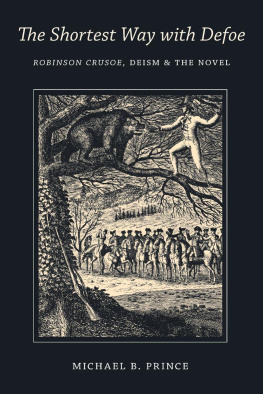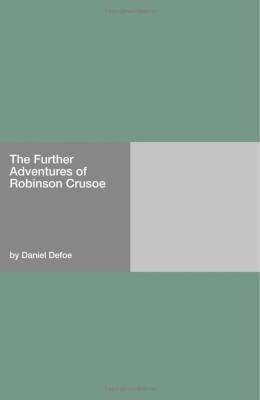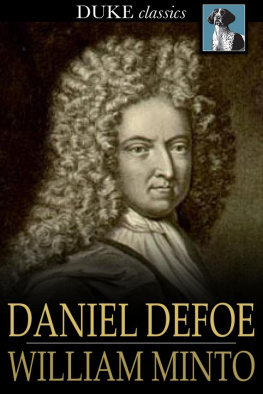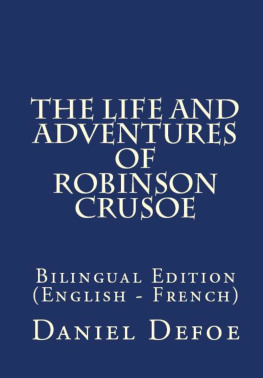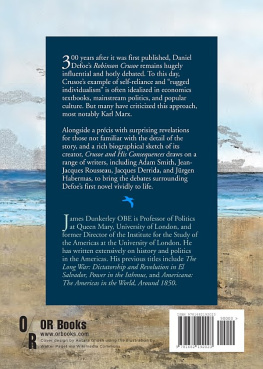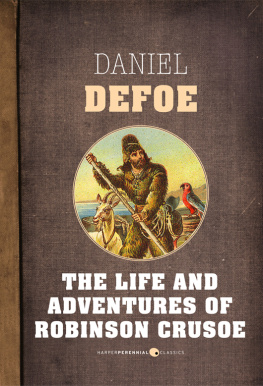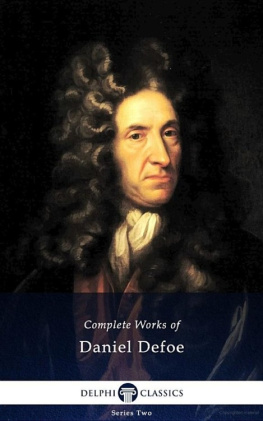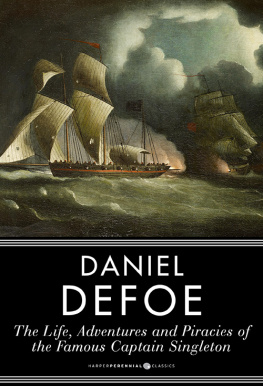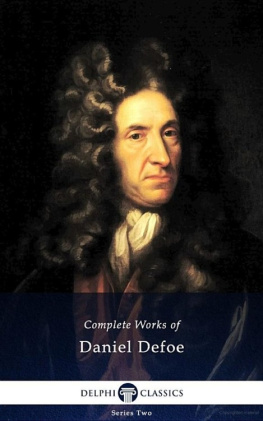The Shortest Way with Defoe
Winner of the Walker Cowen Memorial Prize for an outstanding work of scholarship in eighteenth-century studies
The Shortest Way with Defoe
Robinson Crusoe, Deism, and the Novel
Michael B. Prince
U NIVERSITY OF V IRGINIA P RESS / Charlottesville and London
University of Virginia Press
2020 by Michael B. Prince
All rights reserved
First published 2020
Library of Congress Cataloging-in-Publication Data
Names: Prince, Michael (Michael B.) author.
Title: The shortest way with Defoe : Robinson Crusoe, deism, and the novel / Michael B. Prince.
Description: Charlottesville : University of Virginia Press, 2019. | Includes bibliographical references and index.
Identifiers: LCCN 2019014011 | ISBN 9780813943640 (cloth : alk. paper) | ISBN 9780813943657 (pbk. : alk. paper) | ISBN 9780813943664 (ebook)
Subjects: LCSH : Defoe, Daniel, 1661?-1731 Robinson Crusoe. | Deism in literature.
Classification: LCC PR 3403. Z 5 P 75 2019 | DDC 823/.5dc23
LC record available at https://lccn.loc.gov/2019014011
Cover art: Plate no. 93, Friday and the bear on the Limb. (From Franois Aim Louis Dumoulin, Collection de cent-cinquante gravures reprsentant et formant une suite non interrompue des voyages et aventures surprenantes de Robinson Cruso [(1810) 1962]; courtesy of Harvard University, Houghton Library)
Ralph Cohen, 19172016
In memory and application
Contents
The Puzzle and a Clue Defoes Nemesis An Absurd and Abusive Title Page Defoes Irony Defoes Accomplices Quaker Defoe
A Literary Slough of Despond Failure before Success The Artistic Battle between Defoe and Swift The Lucian Revival, 16201720 Defoes Feathery Craft A Lunar Theory of the Novel?
Defoes Spy Novel The Secret History of the Turkish Spy Orientalism and Literary Deism Aesthetic Problems in the Turkish Spy The Hayy Ibn Yaqzn of Ibn Tufayl and Robinson Crusoe
Robinson Crusoes First Critics Two Jonahs and the Genres of Robinson Crusoe Our Man Kreutznaer The Footprint in the Sand A Coining of Providences Suspect Conversions Sweet Revenge
Erich Auerbach and the Ansatzpunkt Defoes Religion A Vision of the Angelick World A Strange Capitalist The Disappearing Author
Ralph Cohen read the beginning of this book and let me know, in his inimitable way, that the idea had promise. He taught me how to read early modern texts and to ask good questions about them. James Anderson Winn read and offered meticulous comments on the Crusoe chapter shortly before his death, a generosity of spirit and intellect for which I shall be forever grateful. Paula Backscheider was generous with her extensive knowledge of Defoe and alerted me to the challenges of this study. Robert Folkenflik also supported this investigation at an early stage. Throughout the writing of this book, I have benefited from conversations with Christopher Ricks, who read and commented on several chapters. For his generous response to an early study of Auerbachs deist philology, I thank Sacvan Bercovitch, of blessed memory. Marshall Brown encouraged my study of deism and the novel and published a portion of the underlying research in Modern Language Quarterly. Allegra Goodman brought a novelists intuition to the review of each chapter. For help with translations from F. A. L. Dumoulins graphic novel version of Robinson Crusoe, I am grateful to my friend and colleague James Johnson and to Sophia Mizouni. I thank Susan Mizruchi for her steadfast friendship and encouragement. The Boston University Center for the Humanities supported this book early with a Jeffrey Henderson Senior Research Fellowship and late with a Humanities publishing stipend. For her precise work creating the index, I thank Ms. Katherine Hastie. The staff of the Houghton Library at Harvard University provided excellent assistance, as did the reference staff at Yales Beinecke Library. J. William Frost and the staff of the Friends Historical Library at Swarthmore College introduced me to research on the Quakers, and my Quaker friend and colleague, the late Martin Fido, helped me understand Defoes relation to the Quakers. I am especially grateful to Angie Hogan, my editor at the University of Virginia Press, for her immediate receptivity to the proposal and her openness and professionalism throughout the publishing process. It is indeed an honor to publish this book with the University of Virginia Press. Finally, I thank my familymy wife and fellow scholar, Abigail Gillman, and our children, Jacob, Ellen, and Livia, as well as my father, David Prince; my mother, Reva Scheinbaum Prince, of blessed memory; my sister, Erica, and brother, Paul; and my wifes parents, Neil Gillman, also of blessed memory, and Sarah Gillman. I am grateful for the many ways they have enriched my life and supported the writing of this book.
Lessons of the Pillory
Defoes The Shortest Way with the Dissenters, 1702
The Puzzle and a Clue
In the space of about two decades, the son of a candlemaker transforms himself from a brick merchant and political pamphleteer, a Man of great Rashness and Impudence, as one enemy called him, a mean Merceneries Prostitute, a State Mountebank, an Hackney Tool, a Scandalous Pen, a Foul-Mouthed Mongrel, an Author who writes for Bread, and Lives by Defamation, into an artist who launched the English novel. Assuming it was not a freak occurrence, how are we to explain Defoes remarkable breakthrough?
Many have been the attempts to solve this puzzle, and any new effort must rely on the work of preceding generations of biographers, editors, and literary historians. However, the sheer multiplicity of historical informationdeattributions of the voluminous Defoe canon notwithstandinghas posed a great challenge, which Paula Backscheider acknowledges in her exasperated chapter titles Four Hundred Thousand Words and Six Hundred Thousand Words. It is not that Defoe left too few clues; he left too many. A short way from early to late, from bankrupt merchant and topical satirist to the immortal author of Robinson Crusoe, has eluded us.
Yet one clue, ignored until now, takes us immediately to the angry heart of the matter. The year is 1720, the triumph of Robinson Crusoe secure. Defoe nevertheless takes what appears to be a parting shot at someone he despises. His Serious Reflections during the Life and Surprising Adventures of Robinson Crusoe begins with the narrators assurance that The Fable is always made for the Moral, not the Moral for the Fable. One might expect Crusoe to say next what the moral is and how the fable serves it. No such luck. Instead, the narrator adds the following paragraphs, which I quote here in full and refer to throughout this investigation:
I have heard, that the envious and ill-disposed Part of the World have raisd some Objections against the two first Volumes, on Pretence, for want of a better Reason; That (as they say) the Story is feignd, that the Names are borrowd, and that it is all a Romance; that there never were any such Man or Place, or Circumstances in any Mans Life; that it is all formd and embellishd by Invention to impose upon the World.
I Robinson Crusoe, being at this Time in perfect and sound Mind and Memory, Thanks be to God therefore; do hereby declare, their Objection is an Invention scandalous in Design, and false in Fact; and do affirm, that the Story, though Allegorical, is also Historical; and that it is the beautiful Representation of a Life of unexampled Misfortunes, and of a Variety not to be met with in the World, sincerely adapted to, and intended for the common Good of Mankind, and designed at first,

